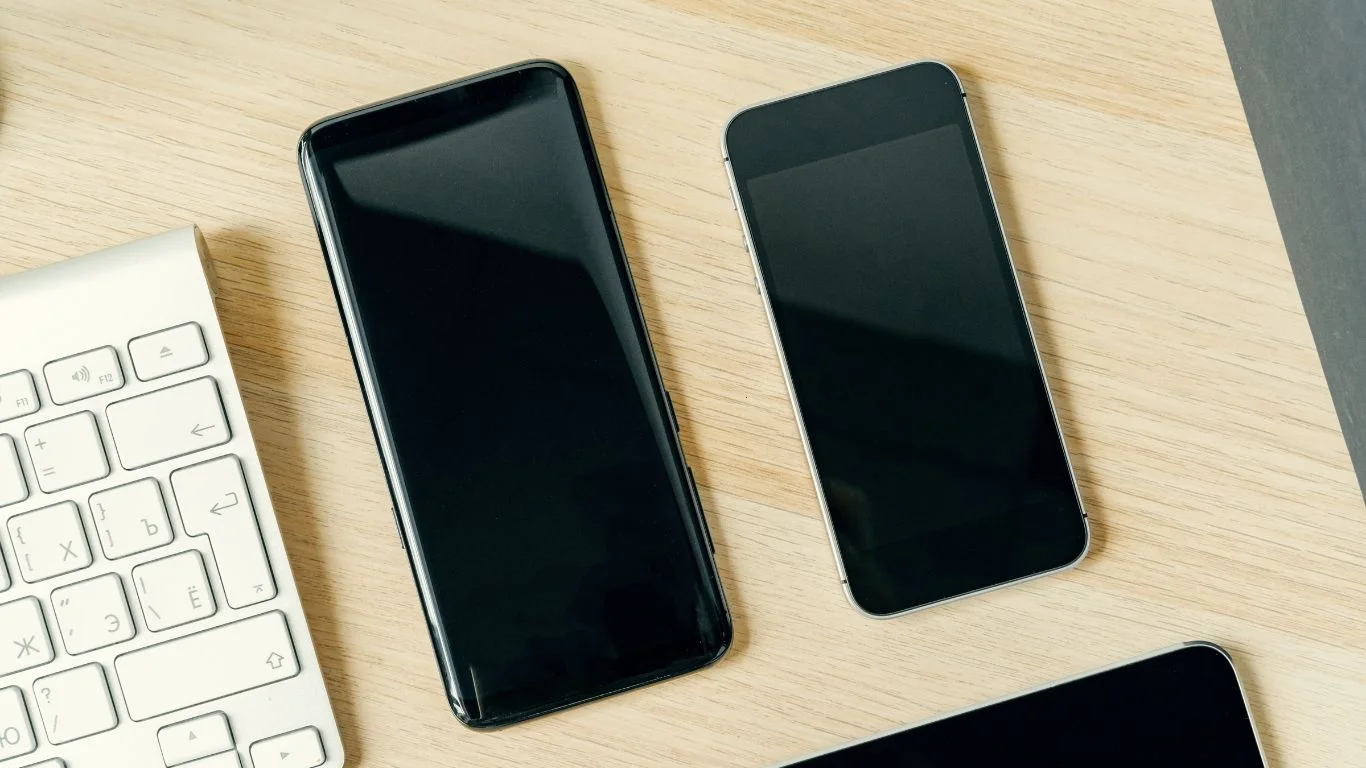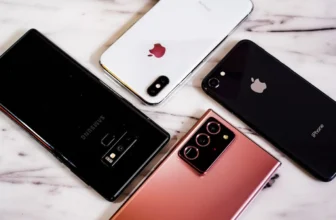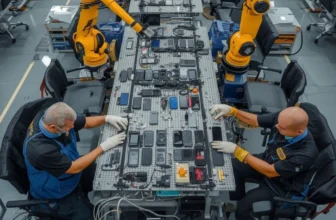
In today’s world, two smartphone giants dominate the market: Samsung and Apple. Their flagship phones, the Samsung Galaxy series and the iPhone series, are continuously pitted against each other in a fierce battle for supremacy. Both brands boast cutting-edge technology, sleek designs, and a loyal customer base. But, the question remains: which one reigns supreme?
In this article, we will compare Samsung Galaxy vs iPhone in various key areas like performance, design, camera quality, software, and ecosystem to help you decide which is the best option for you.
Samsung Galaxy vs iPhone: The Ultimate Comparison
1. Design and Build Quality
When it comes to design, both Samsung and Apple have consistently set the bar high.
- Samsung Galaxy devices often sport larger, edge-to-edge AMOLED displays with curved edges, giving them a more futuristic look. Additionally, the Galaxy series tends to offer more variety in terms of screen size and design.
- iPhone devices, on the other hand, maintain a more minimalist and premium design with flat edges and a sleek aluminum or stainless steel frame. Apple’s signature notch design is noticeable, especially in older iPhone models, although newer models like the iPhone 14 and iPhone 15 have been improving this aspect.
In terms of build quality, both Samsung and iPhone are durable, with Corning’s Gorilla Glass used for protection and an IP68 water and dust resistance rating. However, Samsung’s focus on larger displays might make some users prefer the larger screen experience, while iPhone keeps a more uniform and familiar design that appeals to users seeking consistency.
You May Know About: 5 Signs It’s Time to Replace or Upgrade Your Phone
2. Display Quality
Samsung has long been recognized for its superior display technology, particularly with its AMOLED screens. The Samsung Galaxy S23 Ultra offers vibrant colors, deep blacks, and high contrast ratios, making it perfect for media consumption. Samsung even offers 120Hz refresh rates on many of its devices, which results in a smoother experience when navigating apps and websites.
On the other hand, Apple’s Super Retina XDR OLED display on iPhones is also stunning, with accurate colors and high brightness levels. iPhones have traditionally focused on color accuracy and consistency, rather than pure contrast. Apple’s ProMotion technology, offering 120Hz refresh rates, is also now available on the latest iPhone models, making it more competitive against Samsung’s displays.
3. Performance and Power
In terms of raw power, Apple’s A-series chips (like the A15 and A16 Bionic) have consistently outperformed Samsung’s Exynos and Snapdragon processors. Apple’s chips have a reputation for being more efficient, offering impressive performance while consuming less battery power.
Samsung’s Galaxy S series usually features the latest Qualcomm Snapdragon chips, which are known for their high performance and fast processing power, making them highly competitive against Apple’s A-series. While Samsung’s processors are powerful, Apple’s custom silicon tends to maintain a lead in terms of efficiency and optimization within the ecosystem.
4. Camera Capabilities
Samsung and Apple continue to push the envelope when it comes to smartphone photography.
- Samsung Galaxy devices often feature a larger camera sensor, allowing for better zoom capabilities and more versatile camera setups. The Galaxy S23 Ultra, for example, offers a massive 200MP sensor, providing unrivaled detail and clarity, particularly in zoomed-in shots.
- iPhone, however, focuses on color accuracy, dynamic range, and consistency in both still photography and video. The iPhone 14 Pro and iPhone 15 Pro boast impressive 48MP cameras and have set the bar high for features like cinematic video recording, which gives a shallow depth of field.
Both brands offer night mode, ultra-wide lenses, and macro photography, but Samsung tends to edge out Apple when it comes to the sheer number of lenses and versatile zoom features.
5. Software and Ecosystem
The operating system is one of the most significant factors when comparing Samsung Galaxy vs iPhone.
- Apple’s iOS is often praised for its smooth, user-friendly interface and long-term software support. Apple provides 5+ years of software updates for each device, ensuring that users have access to the latest features and security updates over the years. Moreover, the Apple ecosystem (iMessage, FaceTime, AirDrop, and integration with macOS, Apple Watch, etc.) creates a seamless experience across different Apple devices.
- Samsung Galaxy runs on Android with the One UI skin, offering more customization options, such as the ability to change the home screen, widgets, and themes. Samsung’s Galaxy devices are also known for multi-tasking capabilities, including split-screen and app pairs. However, Android devices generally receive fewer years of software updates than iPhones, although Samsung has been improving its update policies, offering up to 4 years of OS updates and 5 years of security patches for its high-end models.
6. Battery Life
Battery life is one area where both brands have worked hard to improve.
- Samsung Galaxy devices typically offer larger battery sizes compared to iPhones, meaning they have the potential to last longer with heavy usage. In terms of fast charging, Samsung offers faster 25W-45W charging speeds, while wireless charging is also available.
- iPhone models have more optimized battery management, so even with slightly smaller batteries, the devices tend to perform well under normal conditions. Apple’s MagSafe wireless charging is also a standout feature, allowing for easy attachment and charging.
7. Price and Value for Money
When considering price, Samsung Galaxy models offer a wider range of options at various price points. From budget-friendly A series to premium S series devices, there’s something for everyone. Additionally, Samsung frequently offers promotions and trade-in deals.
Apple iPhones, however, generally come at a higher premium. The price difference between base iPhone models and their Pro counterparts is noticeable, and Apple tends to maintain high prices across the board, even for older models.
8. Additional Features
- Samsung Galaxy devices often have more cutting-edge features, such as 5G connectivity, microSD card slots, and S Pen integration in the Galaxy Note and Galaxy S Ultra series.
- iPhones have been slower to introduce certain features like 5G (though now available), but they excel in features like Face ID, MagSafe accessories, and tight integration with other Apple devices.
Which One is Right for You?
When it comes down to the decision between Samsung Galaxy vs iPhone, your choice will depend largely on your personal preferences and priorities.
- If you prefer a larger, customizable display, cutting-edge features, and more flexibility with software, then a Samsung Galaxy may be the better fit for you.
- If you prefer a premium design, longer software support, and a seamless, integrated ecosystem, then iPhone could be your ideal choice.
Both brands offer fantastic smartphones, and each excels in different areas. Ultimately, Samsung Galaxy vs iPhone comes down to what you value most in a device.
Read More About: How to Choose a Smartphone for Kids
Conclusion
Ultimately, the battle between Samsung Galaxy vs iPhone boils down to personal preference. Samsung Galaxy offers more variety and customization, while iPhone provides a more integrated, streamlined user experience. Both are fantastic choices, so the question remains: which one suits your lifestyle better? Only you can decide which reigns supreme!
FAQ’s
Both Samsung and Apple offer excellent cameras. Samsung Galaxy devices tend to offer better zoom capabilities, while iPhones excel in color accuracy and video features.
Both phones are durable, but iPhones generally receive longer software updates, ensuring that they last longer in terms of performance. Samsung is catching up with improved update policies.
Samsung offers a broader range of devices at different price points, making it more budget-friendly compared to the premium pricing of iPhones.
Both phones offer excellent performance, but Samsung’s larger displays and higher refresh rates make it more suitable for mobile gaming.
Yes, iPhones have supported 5G since the iPhone 12, and the newer models come with improved 5G capabilities.
Yes, both brands support universal apps, and you can transfer data between Samsung Galaxy and iPhone using apps like Move to iOS or Samsung Smart Switch.





